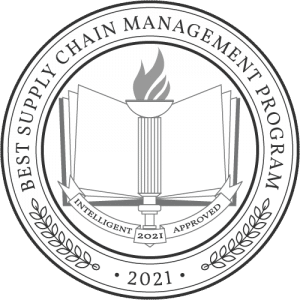| Department: | Management, Marketing, and Information Systems / Rankin College of Business |
| Hours Required: | 120 |
| Categories: | Major, Minor, Undergraduate |
| Delivery: | On-Campus |
Supply chain management coordinates the movement of products all the way from the sourcing of raw materials to the purchasing of products by the final users and the management of customer services. With huge corporations like Walmart, Dell, and Amazon performing millions of transactions a day, effective and efficient supply chain management has become critical to the world economy.
Topics Covered
In the first two years, business students take a broad range of classes both in the Rankin College of Business and across campus. Upper level courses focus on developing the expertise to successfully implement supply chain management strategies
- All Supply Chain majors take courses in supply chain management, enterprise information systems using SAP, business analytics, project management, and environmentally sustainable practices, and may choose nine hours of upper-level electives from any of the departments in the Rankin College of Business.
- Students are encouraged to obtain internships related to their career plans.
- Students are assigned to advisors who are members of the RCB faculty to help with class scheduling, professional mentoring, and career placement.
Supply Chain Management Careers
- Logisticians: manage the life cycle of the company’s product. They also work to meet and understand their customer’s needs.
- Buyers and Purchasing Agents: purchase raw materials, components, products, and services for business and nonprofit organizations.
- Purchasing Managers: oversee buyers and purchasing agents for business and nonprofit organizations.
Alumni Profiles
- Ashlyn Upton (BBA 2017), Logistics Coordinator at Ledwell Office Solutions
- Nick Whitley (BBA 2018), PotlatchDeltic
Student Engagement
- Student organizations like Phi Beta Lambda, ENACTUS, Emerging Entrepreneurs, the Finance and Economics Society, and the Business Student Investment Advisory Council provide opportunities for fun, leadership, and networking
- Guest lectures and workshops conducted by business professionals and recognized speakers
- Student travel both within and outside the region and the US: Recent trips included tours of financial institutions in New York and Chicago, advertising agencies in Dallas and Chicago, and Arkansas businesses like Walmart, Tyson, and J.B. Hunt and international destinations such as Costa Rica.
- The Arkansas Small Business Development and Technology Center is located on the first floor of the business building. The center offers seminars and other resources that are free to students and houses the Entrepreneurship Center.
Faculty Expertise
The Rankin College of Business is AACSB certified. All upper-level professors are required to hold doctorates from AACSB certified universities or to have significant professional experience in the areas in which they teach.
- Faculty are leading researchers in the field.
Faculty have credentials related to SAP, an ERP (Enterprise Resource Planning) platform used by major companies around the world.
Learning Goals
- Graduates from the College of Business can communicate effectively.
- Our graduates are prepared to be socially responsible citizens.
- Our graduates can think critically, solve problems, and make informed decisions.
- Our graduates can use technology effectively in their fields.
- Our graduates have content knowledge in their chosen fields and the necessary skills to be successful.
The Bachelor of Business Administration degree in management requires a total of 120 hours. Courses in this program include the following:
- Leadership and Ethics
- Human Resources Management
- Supply Chain Management
- Total Quality Management
- Entrepreneurship
University Requirement (2 hours)
GSTD 1002 – Freshman Seminar
General Education (35 hours)
Note: ECON 2103 – Principles of Microeconomics is required.
Business Core (54 hours)
ACCT 2113 – Survey of Accounting
ACCT 2003 – Principles of Accounting
FIN 2003 – Personal Finance
ECON 2203 – Principles of Macroeconomics
GBUS 2003 – Legal Environment of Business
GBUS 2013 – Statistics and Analytics I
IS 2053 – Business Information Systems
MGMT 2003 – Business Communications
Admission to the College of Business is required to enroll in the following courses:
FIN 3003 – Financial Management
GBUS 3183 – Statistics and Analytics II
IS 3023 – Introduction to Data Visualization
IS 3053 – Managing Information Systems
MGMT 3023 – Organizational Theory and Behavior
MGMT 3073 – Professional Communication Strategies
MGMT 4063 – Operations and Supply Chain Management
MGMT 4093 – Management Strategy and Policy
MKTG 3033 – Principles of Marketing
Select 3 hours from the following:
MGMT 4043 – International Business
MGMT 4313 – International Studies and Field Experience
MGMT 4101 – International Studies and Field Experience and MGMT 4102 – International Studies and Field Experience
Supply Chain Management (24 hours)
SCM 3033 – Supply Chain Management Technology
SCM 3043 – Business Analytics
SCM 3053 – Project Management
SCM 4053 – Environmentally Sustainable Practices
SCM 4073 – Supply Chain Management
9 hours of upper-level business electives
Electives (5 hours)
5 hours of unrestricted electives
Total Hours – 120
Minor Requirements:
Minor Requirements (15 hours)
- SCM 4073 – Supply Chain Management
- 12 hours of upper-level Supply Chain Management electives


